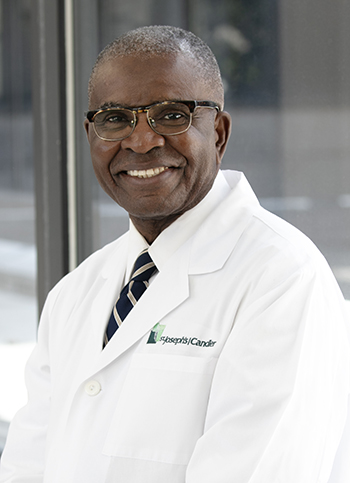Not sexy but massively important! How to control high blood pressure.
Heart Health
St. Joseph’s/Candler primary care physician explains the benefits to lowering your blood pressure
- Controlling your blood pressure will reduce risk of heart failure by 50 percent, Dr. Nwosu says.
- When you control your blood pressure, it decreases the risk and incidence of stroke by 35 to 40 percent.
- If you decrease your blood pressure just by 2 millimeters, it will decrease your risk of stroke by 10 percent.
- The risk of having a heart attack goes down by 20 to 25 percent with a controlled blood pressure.
- That 2 millimeter drop also decreases your risk of heart attack and coronary artery disease by 7 percent.
“So even just a two-millimeter reduction is a big deal,” says Dr. Eugene Nwosu, internal medicine physician at St. Joseph’s/Candler Primary Care located on Eisenhower Drive. “These are major risks associated with hypertension and by managing them, you will make a difference.” 
Blood pressure is the force of blood pushing against the artery walls. The force is created with each heartbeat as blood is pumped through the arteries. Our arteries carry blood from the heart to other organs.
Related Article: What is high blood pressure?
Getting your blood pressure under control can help add years to your life when adopting new, healthy lifestyle habits. It also can lower your risk of severe complications that can come with uncontrolled blood pressure, Dr. Nwosu says.
A normal blood pressure is a top number of less than 120 and a bottom number of less than 80. Pre-hypertension, or elevated blood pressure, is defined when the top number is between 120-129 and the bottom one is less than 80. Your blood pressure is considered stage one hypertension when the top number is between 130-139 and the bottom number is 80 to 89. Stage two is anything higher than that.
“The majority of people don’t have symptoms. They have no clue that they have high blood pressure,” Dr. Nwosu says.
If left untreated, high blood pressure can lead to kidney disease, osteoporosis, heart attack, heart failure, cardiac arrest, aortic aneurysm and stroke, Dr. Nwosu says.
So what are ways to lower my blood pressure?
If you have elevated to high blood pressure, the first thing you can do, and that your physician will recommend, is make healthy lifestyle modifications, Dr. Nwosu says. These include:
- Manage your weight
- Decrease salt
- Increase potassium
- Exercise/get regular physician activity
- Stop smoking
- Limit alcohol consumption
- Control stress
- Control your cholesterol
- Control your blood sugar
“When people have high blood pressure and embrace lifestyle changes and follow those changes, that might be all they need. They might not need medication,” Dr. Nwosu says. “Or, if you still aren’t reaching your goal but are embracing lifestyle changes then just one or two medications can help.”
If you have been diagnosed with high blood pressure, taking actions to help get your numbers down can make an impact on your health – now and in the future. Be sure to talk to your primary care provider about healthy ways to live a healthy lifestyle.